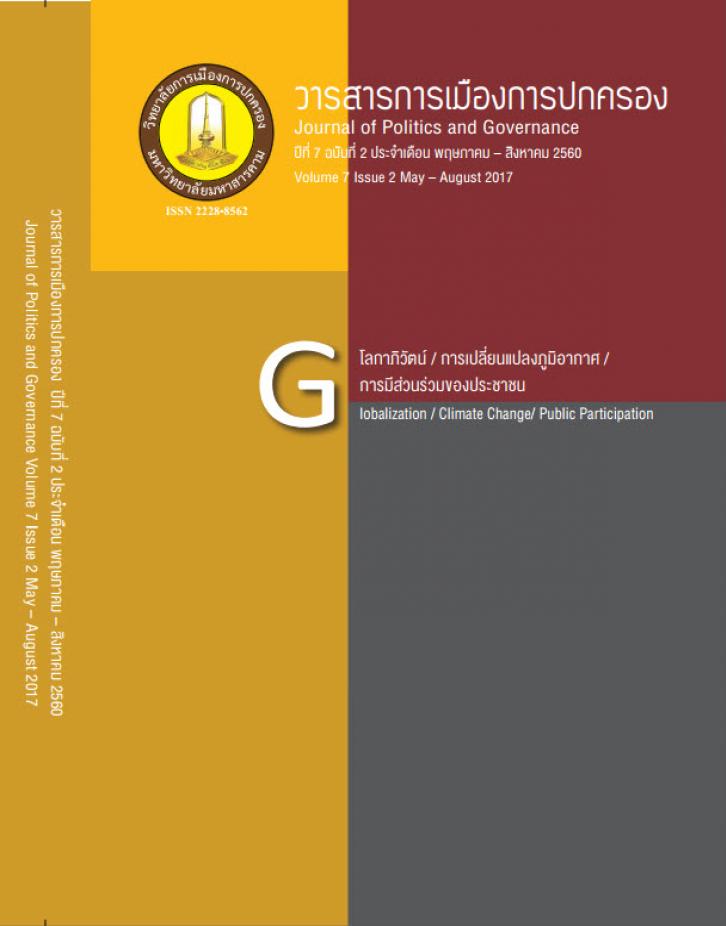A Study of Sandwich Role of Working Generations in Multigenerational Family
Main Article Content
Abstract
A Study of Sandwich Role of Working Generations in Multigenerational Family aims to 1) study the characteristics of working generations who take sandwich roles in a family with independent family members 2) determine guidelines for working generations in dealing with family and work. This study employed qualitative method, using an in-depth interview as a tool in studying. Research samples included 12 working generations who work in public and private organizations, aged between 25-60 years old and have been living with independent family members. The result shows that working generations in Thai culture take many roles in family, including roles as a husband or wife, a housekeeper, a worker, parents, and a son/daughter who takes care of their parents all together. Though working generations play many roles for independent family member, they were as an independent family member as well when they depend on their parents’ care for their children. On the other hand, their parents depend on working generations when travelling. Therefore, working generations and older generations in the Thai culture appeared to have dependent relationship, not the older generations depend only on working generations. The study also shows that the time is a major problem for working generations, especially for those who have inflexible working hours. Hence, this study suggests to employ work-life balance (WLB), introduced by Greenfield C. and Terry M. (1995) in the workplace, including Flexible work program, Time saving, Family members care program, Leave program, and financial supporting program in order to reduce conflict between work and family.
Article Details
References
ภาณุภาคย์ พงศ์อติชาต. (2549). Work-Life Balance. ผู้จัดการรายสัปดาห์ (HR Section), วันที่ 24-29 เมษายน 2549.
วราภรณ์ ตระกูลสฤษดิ์. . (2545) จิตวิทยาการปรับตัว. พิมพ์ครั้งที่ 2. กรุงเทพมหานคร: สำนักพิมพ์ศูนย์ส่งเสริมวิขาการ.
สำนักงานสถิติแห่งชาติ. (2561). มองภาพครัวเรือนไทยในรอบ 10 ปี. สืบค้นจาก: http://service.nso.go.th/nso/web/article/article_62.html (5 เมษายน 2561).
Agree, E., Bissett, B., & Rendall, M. S. (2003). Simultaneous care for parents and care for children among mid-life British women. Population Trends, 112, 29-35.
Biernat, B. A. (1997). Employed parents’ preference for reduced job hours in relation to job and family characteristics. University of Minnesota.
Cooke, R. A. & Rousseau, D. M. (1984). Stress and strain from family roles and work-role expectations. Applied psychology, 69(2), 252-260.
Dykstra, P. A. (2010). Intergenerational family relationships in ageing societies. United Nations Economic Commission for Europe.
Feinberg, L., Reinhard, S. C., Houser, A., & Choula, R. (2011). Valuing the Invaluable: 2011 Update, the growing contributions and costs of family caregiving, AARP Public Policy Institute Insight. 51.
Felstead, A., Jewson, N., Phizacklea, A. & Walters, S. (2002). Opportunities to work at home in the context of work–life balance. Human Resource Management Journal, 12 (1), 54–76.
Grandey, A. A. & Cropanzano, R. (1999). The conservation of resources model applied to work-family conflict and strain. Journal of Vocational Behavior, 54, 350-370.
Greenfield, C. and Terry, M. (1995). Work/life: From a set of programs to a strategic way of management. Employment Relations Today, Autumn, 67 - 81.
Greenhaus, J. H. & Beutell, N. J. (1985). Sources of conflict between work and family roles. Academy of Management Review.
Matthews, S. H. & Sun, R. (2006). Incidence of four-generation family lineages: Is timing of fertility or mortality a better explanation. The journals of gerontology. Series A,
Biological sciences and medical sciences, 61(2), 99.
Netemeyer, R. G., Boles, B. S., & McMurrian, R. (1996). Development and validation of work-family conflict and family-work conflict scales. Journal of Applied Psychology, 81, 400-410.
Shoemaker, J., Brown, A. & Barbour, R. (2011). A revolutionary change: Making the workplace more flexible. Solutions. 2(2).
Voydanoff, P. (2005). Toward a conceptualization of perceived work-family fit and balance: A demand and resources approach. Journal of Marriage and Family, 67, 822 - 836.
White, J. & Klein, D. (1996). Family Theories-An Introduction. Sage Publication International Educational and Professional Publisher Thousand Oaks, London, New Delhi.
White, M., Hill, S., McGovern, P., Mills, C. and Smeaton, D. (2003). ‘High-performance’ management practices, working hours and work–life balance. British Journal of
Industrial Relations, 41(2), 175–195.


